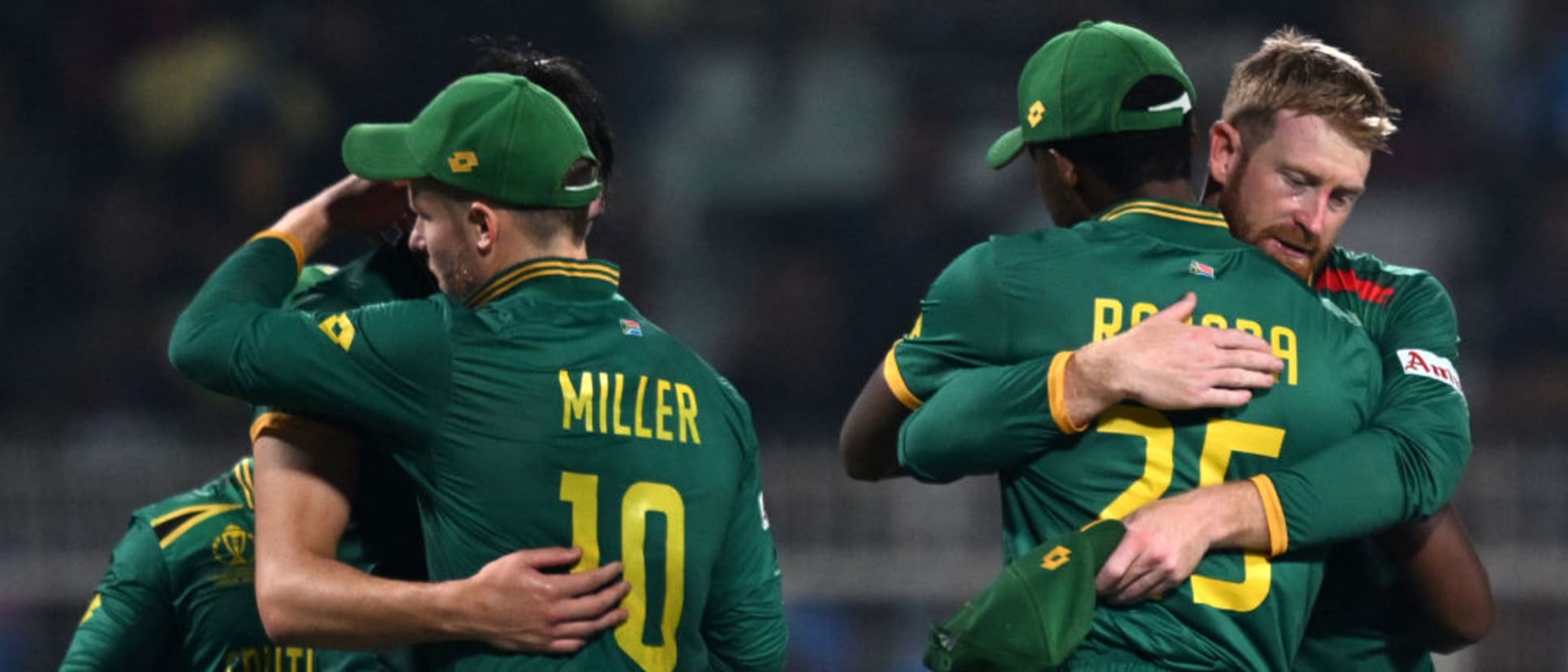Déjà vu for South Africa as semi-final post-mortem begins

The 2023 edition of the South African semi-final story had a different feel to it, a spirited effort in defeat rather than a gut-wrenching choke perhaps.
And yet, at the same time, there are so many reasons for South African regret.
This was a team who finished second in the league standings having hammered their semi-final opponents earlier in the tournament by 134 runs.
This was also a team that had produced some of the best batting displays of the tournament, with opener Quinton de Kock finishing as one of the leading run-scorers.
Australia beat South Africa by three wickets.
And this was a team who got what they wanted at the toss and chose to back their batting strength in Kolkata conditions that appeared helpful to bowlers.
A three-wicket loss doesn’t quite tell the story, with South Africa recovering from 24/4 in the 12th over to reach a competitive score thanks to David Miller’s excellence.
And then with the ball it was a performance that showed spirit and heart right to the end.
But, for all of the positives, captain Temba Bavuma was left to do the interview as losing semi-final captain, for the fifth time in ODI World Cup history.
“It’s quite hard to put it into words,” Bavuma said as he spoke to Michael Atherton at Eden Gardens. “I think firstly congratulations to Australia, all the best to them in the final. They were outstanding for a large part of the game and thoroughly deserved the victory.
David Miller hit 13 boundaries during his 101
“I think our character came through, that bit of resilience that we always think about. It was a bit of a dogfight.
“But looking at the result of the game, the way we started with the bat and the ball was probably the turning point, we lost it quite badly there. And we always had to play catch-up to get ourselves back into the game.”
Resilience and fightbacks don’t tally well with the choker tag that South Africa are so often saddled with, and coach Rob Walter agrees that this defeat was far from being a choke.
“I mean I guess you need to define what a choke is," he said. "For me, a choke is losing a game that you're in a position to win. In this instance, we were behind the eight-ball right from the word go and we actually fought our way back into the competition and put up a score that gave us a chance.
“Of course we were 30 runs or 40 runs short, but still, having them seven down and a couple of things – balls bouncing just short, a little inside edge that could have been taken.
“For me there's nothing even remotely close to a choke that happened out there today. It's a serious contest between two good teams, number two and three in the tournament.”
South Africa are a bat-first team. But faced with overcast conditions and an Australian attack featuring some serious quality with the ball, their start with the bat did not exactly go according to plan.
“I think it was the conditions combined with the quality of the attack,” Bavuma said when asked why South Africa were quite so poor in the opening 12 overs. “(Josh) Hazlewood as well as (Mitchell) Starc up front, they were ruthless.
“They exploited every bit of advantage that was presented to them with the conditions and they really put us under pressure. I think when you’re 4/24 you’re always going to struggle to get a competitive total.”
Mitchell Starc and Josh Hazlewood struck twice.
Should Bavuma perhaps have read conditions differently and opted to bowl first? His head coach says no - that did not tally with what anyone at the ground would have said prior to the match.
“Hindsight isn't an exact science, is it?” Walter said. “To be honest, even the commentators that I've spoken to, no one could predict how the pitch would play for the first 12 overs. And had it played as we expected it to, then we would have backed ourselves to get 270.
“You saw how much it spun in the evening – we knew that that was going to be our end into the game and ultimately it was really. We just didn't have enough runs to work with. Had those first ten overs looked a little bit different, it's easy to say at the back end of losing, but I think the contest would have been even a touch closer than it already was.”
The selection of Tabraiz Shamsi as an extra spinner was proved justified by an excellent performance from the spinner, who took 2/42 and very nearly did enough to spark a remarkable comeback with the ball.
Australia had looked in complete control at 60 without loss after six overs, but Shami and fellow spinners Keshav Maharaj and Aiden Markram ensured it was a tense finale at Eden Gardens.
Tabraiz Shamsi had Glenn Maxwell bowled for one.
“We would have obviously liked to have bowled a bit better early, it allowed the other batters to play themselves in,” Bavuma said. “But Shamsi was terrific.
“We felt (the total) was competitive but we needed a lot to go right. We had chances, tough chances, that we put down. Maybe we could have been more proactive, get guys a bit closer, but you need things to go your way.”
The wait for a men’s final appearance at an ICC World Cup goes on, with attention now turning to next year’s ICC Men’s T20 World Cup in the Caribbean and USA.